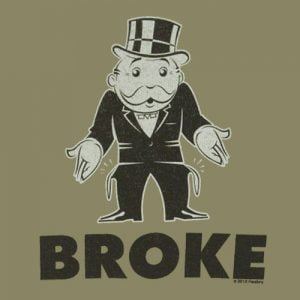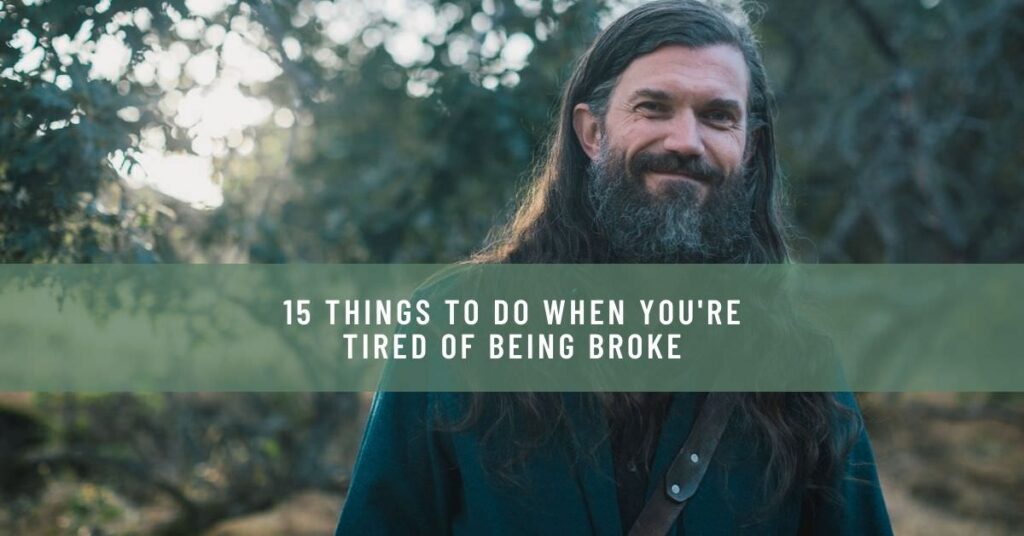
I think it resonated with people because they’re tired of feeling like their self worth needs to be tied to the amount of money they make or that their choices to work with people with less money, or to take time off for fun are wrong. And maybe they liked knowing that someone they might have assumed always had money sometimes went broke.
But since writing it, I’ve wanted to write this to talk about the other side of it: sometimes you are tired of being broke.
And that’s okay too.
Sometimes it can be fun to be reckless and a bit irresponsible and go on adventures, buy things we shouldn’t because it adds joy to our lives.
And sometimes there’s the aftermath.
There’s the non profit we wish we could give money to that we can’t.
We aren’t able to pay rent or our bills and we feel mortified about it.
We owe money to dear friends who trusted we’d pay them back soon and we just haven’t been able to.
Our spouse or partner is breathing down our neck and needing us to pull it together.
We’ve not taken growing our business entirely seriously, we haven’t gotten the help we really need to get and we find ourselves in debt, scrambling and feeling desperate. Even though we know that slow marketing is an approach that makes sense . . . we don’t have time for it anymore. We need answers and money fast.
Being broke is okay – there’s nothing wrong with it – but, sometimes, you just don’t want to be anymore. And that’s okay too.
As easy as it can be to knock the constant barrage of teachers out there promising to help you get to six figures . . . let’s remember that six figures isn’t that much for a family. Depending where you live in the world, you may or may not have health care and most families are one major illness away from bankruptcy. There’s student debt, credit card debt, unexpected expenses, the mortgage, sending your kids to college and supporting them in their dreams and, of course, trying to invest in your business.
There’s nothing wrong with being broke, but there’s also nothing wrong with wanting to have your needs met and have your financial life feel sustainable and debt free.
There’s nothing wrong with being broke, but there’s also nothing particularly noble about it. And I’ve seen so many friends almost brag about how broke they are because it gives them more anti-capitalist, social justice ‘cred’ but, in reality, they don’t feel good about it. It stresses them out. They’re constantly anxious about it. There’s a way that we can collapse about money and give up but we can also posture and pretend that everything is okay when it really isn’t.
Being broke doesn’t make us more real, legit or ‘down with the people’. And having a lot of money doesn’t make us cooler, more successful or better.
If you’re like me, you’re not interested in being a billionaire. Or even a millionaire.
But I think most of us underestimate how much money (and creativity) it might take to responsibly create the kind of sustainable lifestyle we really want. I think because of our aversion to money most of us resist taking a real honest look at that.
Sometime we’re okay with skimming by and incurring debt – and sometimes it’s not okay.
And here’s another twist: making money can be fun. I just got off of a Skype chat with Mark Silver of HeartofBusiness.com who is one of the hidden gems in the marketing world. He’s got about 9,000 people on his email list (like me) and is poised to be a million dollar business based purely on his slow and steady approach to business. Neither he nor I are particularly driven by making money but at one point he said, “You know, I don’t need to make that kind of money but . . . it’s kind of fun.”
Making money can become a fun challenge. It can be a game. It doesn’t have to feel heavy. It’s one (of many) metrics we can use to measure our business growth and challenge ourselves like some people do with mountain climbing, triathalons etc. It has zero to do with your self worth. And, ironically, the more you realize that the amount of money you make and your fundamental self worth have absolutely no relationship . . . the more fun making money can be, because you’re no longer taking the ups and downs personally.
If you’re in a place where it’s stopped feeling fun to be broke, then it’s time to move into to extreme self care mode and treat it like the minor crisis it likely is.
Here are fifteen quick thoughts on the way out of that situation (and I welcome your additions to it). This list is far from exhaustive but it’s a good start:
- extreme self care practices: this is a time to get into physical shape, meditate, journal – whatever helps you feel stronger, more directed, more full – do it. When you’re in a financial crisis, it’s easy to cut your self care out but it’s actually the most important thing to boost. The better you feel about your self the better you can do all of these other steps.
- clean up your home and office: nothing signals fresh start like clearing out a space. Do a massive purge and clean. You will feel amazing and full of energy after you do it. You will feel energized about handling your money. And, every morning when you wake up and see it, your environment will inspire you to stay on track. Clean it and keep it clean.
- eliminate what’s draining your energy: this is huge. There are likely certain people, situations and dynamics that are draining your energy and, when you’re in crisis, having your energy drained is not an option. It’s time to say ‘no’ to anything that is sucking your energy. This can be a time where you need to take space from certain friends and family. There are things you are ‘tolerating’ that take so much more out of you than you can imagine.
- stop wasting time: do you spend too much time on facebook, surfing the net, watching TV? Consider going on a fast from those things or giving yourself a hard limit of 30-60 minutes a day.
- ask for any money that is owed to you: do you have friends or clients who owe you money? This is a good time to follow up on that.
- get a part time job: for some reason, this feels like failure to a lot of people. But it’s not. Sometimes you just need to get a job to tide yourself over. And sometimes people realize that being an entrepreneur isn’t for them. Which is a huge relief. I’ve seen a number of clients let go of their ideas about being self employed, go back to a job and watched them experience an immediate increase in happiness, financial stability and overall well being. Getting a job when you need it isn’t failure, it’s self care. And sometimes it’s just a matter of timing and you need to get a job and slowly build your business on the side until it’s at a point you can invest more.
- get out of any commitments you can to free up time: this is also huge. Are you on a board or committee that isn’t 100% filling you up? Are you volunteering somewhere? Look at where you’re spending your time and eliminate anything you possibly can that isn’t a 100% ‘yes’ to you.
- set a goal and create a plan to make money (and start with the low hanging fruit): sit down with a pen and paper and give yourself an hour or two to really get clear on what your goal is around money and how you can best achieve it. Is it to get a job? Do a major promotion of some product or service? If you fail to plan, you plan to fail.
- set aside chunks of each day where all you focus on is making money and growing your business: it’s easy to make a plan and then not do the plan. Set aside time (one hour a day, four hours a day or one day a week) where all you’re focused on is making your plan happening. Allow zero distractions during that time – cell phone off. Social media off. Lock the door. Focus. Most people are blown away with how productive they are when they do this.
- get support: this is so huge. Maybe you need to hire a coach. Maybe you need to get a friend of colleague who you can chat with once a week to stay accountable. Maybe you need to get some kind of to do list manager. Maybe you need to read a marketing book. Maybe you need to trade with a friend for web design. Whatever support you need, it’s time to get honest with yourself about that and get it. And you might want to consider therapy around money too. If this has been a lifelong struggle, there’s a good chance there are some deeper issues worth facing. Dealing with money issues might just be the most powerful personal development work you ever do.
- brainstorm on how to cut expenses: can you move to a cheaper place? eat in more? ride your bike vs. driving your car? Where can you trim expenses in your life? Most people would be shocked at how much they can save with a little thought and creativity.
- stop working on creating more free content: unless they are a direct lead into your products or services. It’s easy to want to keep creating more free content (like me here on this blog when I should be working on my Niching for Hippies program (#doasisaynotasido)).
- focus: speaking of niching – pick one and focus on it. When you’re in a crunch is not the time to try and ‘reach everyone’. You absolutely need to focus on something in particular that you’re offering to a particular crowd of people. And it’s a good idea to focus on just a few marketing approaches and really work them. Maybe all you do is public speaking. Maybe it’s all virtual presentations and webinars. Maybe it’s networking events or hosting events. Whatever it is, I wouldn’t have more than three marketing tactics you’re using. When you’re in a crisis, you need to focus.
- create a higher end product: My colleague George Huang created a six figure income in 72 days using five simple steps to fill up his high end coaching program. You can read about them here.
- connect with hubs: And how do you promote and get clients for your programs and products? You need a way to not only identify but then keep track of potential partners and hubs you come across. Unless you want to be stuck at the ‘cold’ level of marketing you must start thinking about your hubs. And then I recommend connecting with one hub a day getting to know them, what they do, how you can help them and how they might be able to help you. Just ask them out for coffee or to skype to chat and ask their advice on how you should grow your business.
What other ideas and insights do you have here? If you’ve gotten yourself from being broke to having money, what did you do?

